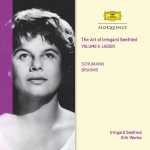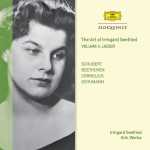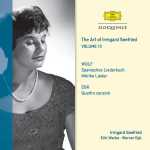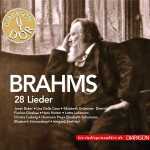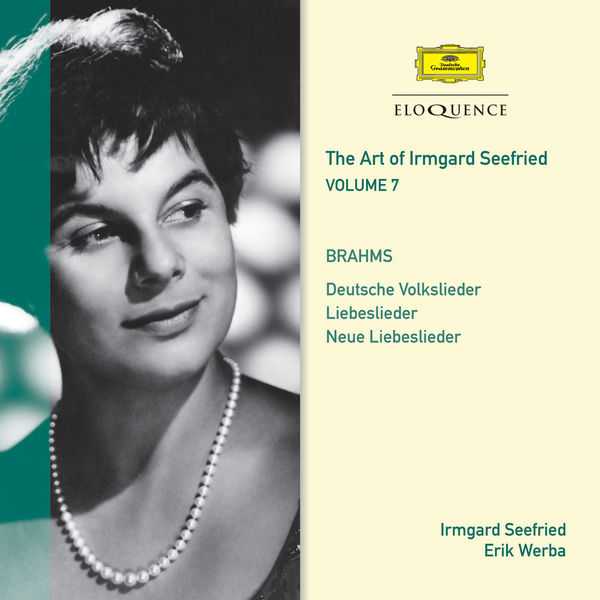
Composer: Johannes Brahms
Performer: Irmgard Seefried, Erik Werba
Format: FLAC (tracks)
Label: Deutsche Grammophon
Catalogue: ELQ4807233
Release: 2014
Size: 283 MB
Recovery: +3%
Scan: cover
Deutsche Volkslieder, WoO 33
01. 5. Die Sonne scheint nicht mehr
Sechs Gesänge Op. 7
02. 4. Die Schwälble ziehet fort
German Folk Songs, WoO 35
03. 6. Da unten im Tale
Sechs Gesänge Op. 7
04. 5. Die Trauernde
Deutsche Volkslieder, WoO 33
05. 25. Mein Mädel hat einen Rosenmund
06. 15. Schwesterlein wann gehn wir nach Haus?
07. 42. In stiller Nacht
08. 14. Maria ging aus wandern
09. 34. Wie komm ich denn zur Tür herein?
10. 35. Soll sich der Mond nicht heller scheinen
11. 30. All mein’ Gedanken die ich hab
Liebeslieder-Walzer, Op. 52
12. 1. Rede, Mädchen, allzu liebes
13. 2. Am Gesteine rauscht die Flut
14. 3. O die Frauen, o die Frauen
15. 4. Wie des Abends schöne Röte
16. 5. Die grüne Hopfenranke
17. 6. Ein kleiner, hübscher Vogel nahm den Flug
18. 7. Wohl schön bewandt war es vorehe
19. 8. Wenn so lind dein Auge mir
20. 9. Am Donaustrande, da steht ein Haus
21. 10. O wie sanft die Quelle sich
22. 11. Nein, es ist nicht auszukommen
23. 12. Schlosser auf, und mache Schlösser
24. 13. Vögelein durchrauscht die Luft
25. 14. Sieh, wie ist die Welle klar
26. 15. Nachtigall, sie singt so schön
27. 16. Ein dunkler Schacht ist Liebe
28. 17. Nicht wandle, mein Licht, dort aussen
29. 18. Es bebet das Gesträuche
Neue Liebeslieder Waltzer, Op. 65
30. 1. Verzicht, o Herz, auf Rettung
31. 2. Finstere Schatten der Nacht
32. 3. An jeder Hand die Finger
33. 4. Ihr schwarzen Augen
34. 5. Wahre, wahre deinen Sohn
35. 6. Rosen steckt mir an die Mutter
36. 7. Vom Gebirge, Well’ auf Well’
37. 8. Weiche Gräser im Revier
38. 9. Nagen am Herzen
39. 10. Ich kose süss mit der und der
40. 11. Alles, alles in den Wind
41. 12. Schwarzer Wald, dein Schatten ist so düster
42. 13. Nein, Geliebter, setze dich
43. 14. Flammenauge, dunkles Haar
44. 15. Zum Schluss: Nun, ihr Musen genug
After Irmgard Seefried’s death in 1988, her contemporary Elisabeth Schwarzkopf – never one to dish out compliments lightly – commented: ‘All of us envied her, because what we had to achieve laboriously worked for her so naturally and as a matter of course, because she knew how to sing from the heart’.
Freshness, spontaneity, natural warmth of feeling, allied to a voice of gleaming beauty and a delightful stage presence: these were the hallmarks of a much-loved soprano who for three decades charmed and moved audiences in the theatre and concert hall, her face as expressive as her voice. As John Steane memorably put it in Gramophone, ‘it was as though she wore her own spotlight’.
Born in the Swabian town of Köngetried in 1919, Seefried was ‘discovered’, aged twenty, by Herbert von Karajan in Aachen, where she made her operatic debut as the Priestess in Aida. In 1943 she sang Eva in Die Meistersinger for the Wiener Staatsoper, initiating an association that lasted until 1976. It was in Strauss and Mozart that Seefried was most admired.
Issued over eleven single-disc volumes, Deutsche Grammophon / Eloquence pays tribute to Irmgard Seefried, bringing back to circulation several recordings that have never previously been issued on CD. The music ranges through opera and oratorio, with an especially generous offering of art song from a range of composers, including Schubert, Schumann, Wolf, Hindemith and Egk. The notes for the series have been written by that leading connoisseur of the voice, Richard Wigmore.
Seefried’s radiance and imaginative strength also made her a cherishable Lieder singer over an enterprisingly wide repertoire. Her spontaneous immediacy of response and emotional warmth are priceless assets in these cameos of love yearned for, love lost and love betrayed. Her trusted pianist Erik Werba too, reveals a natural feeling for Brahmsian rubato, sensing unerringly when to linger and when to urge on.
Seefried’s unselfconscious charm was in its element, too, in Brahms’s Liebeslieder and Neue Liebeslieder waltzes, most famously in a 1952 Edinburgh Festival performance where her partners included Kathleen Ferrier and Julius Patzak. These studio recordings, with Waldemar Kmentt, Eberhard Waechter and the Finnish contralto Raili Kostia, date from a decade later, when her higher notes could grow a tad shrill. But she and her colleagues relish the lyric grace and vivacity of these delectable salon pieces, with Werba and Weissenborn ever-alert to their Viennese sway and lilt.
